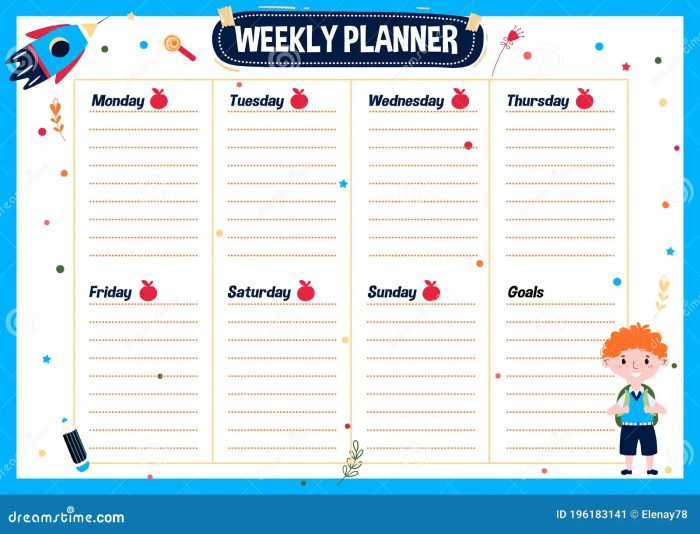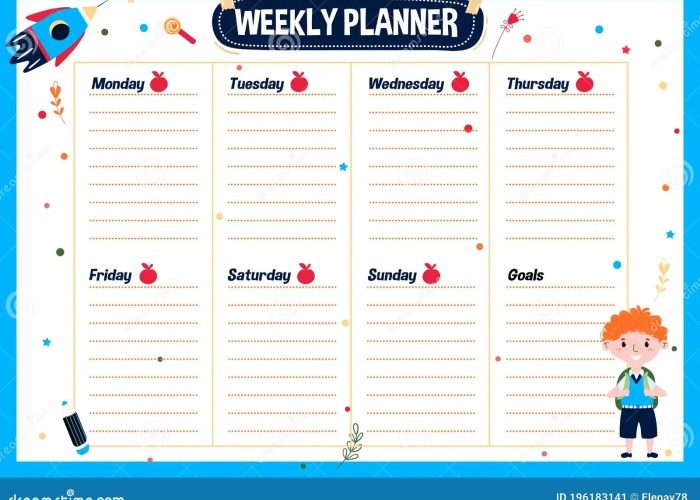Tired of feeling overwhelmed by daily tasks and lost in a sea of to-dos? A well-designed weekly schedule planner can be your secret weapon for increased productivity and stress reduction. From meticulously crafted calendars to digital apps, this guide explores various types, features, and strategies to help you conquer your week and achieve your goals.
This comprehensive guide delves into the world of weekly schedule planners, examining their various forms, from physical planners to sophisticated digital tools. We’ll explore the key benefits, practical use cases, and essential features to help you choose the right planner to fit your unique needs and lifestyle.
Introduction to Weekly Schedule Planners
Weekly schedule planners are tools designed to help individuals organize their time and tasks over a seven-day period. They serve as a central hub for managing commitments, deadlines, and personal goals, enabling users to achieve greater productivity and efficiency.
Types of Weekly Schedule Planners

Weekly schedule planners come in various forms, catering to diverse preferences and needs. They can be categorized into digital, physical, and hybrid formats.
-
Digital Planners: These planners utilize software or applications on computers, tablets, or smartphones. They offer flexibility and portability, allowing for easy updates and access from anywhere. Examples include Google Calendar, Outlook Calendar, and various dedicated scheduling apps.
-
Physical Planners: These planners are tangible documents, such as notebooks, calendars, or journals. They provide a tactile experience and are often preferred for their visual appeal and potential for handwritten notes.
-
Hybrid Planners: Combining digital and physical elements, hybrid planners often use a physical planner as a base, with digital tools for supplementary scheduling and reminders.
Formats for Weekly Schedules
Weekly schedules can be presented in various formats, each with its own strengths.
-
Calendar Format: A calendar visually displays the days and times, making it ideal for appointments and scheduled events.
-
List Format: A list format, often used in conjunction with a task management app, provides a straightforward way to jot down tasks and deadlines.
-
Grid Format: A grid format allows for a structured view of tasks and time allocation across the week, enabling better visualization of work flow.
Key Benefits of Weekly Schedule Planners
Using weekly schedule planners offers numerous advantages, including increased productivity, improved time management, and enhanced personal goal achievement.
-
Increased Productivity: By clearly outlining tasks and deadlines, weekly schedule planners help users stay focused and on track.
-
Improved Time Management: Planning ahead and allocating time for various activities optimizes time utilization.
-
Enhanced Personal Goal Achievement: By breaking down larger goals into smaller, manageable tasks, weekly schedule planners aid in progress tracking and achievement.
Common Features in Weekly Schedule Planners
Various features are commonly found in weekly schedule planners, designed to enhance organization and user experience.
-
Task Listing: Space to list tasks, deadlines, and appointments.
-
Time Blocking: Designated time slots for specific tasks.
-
Reminders: Features to set reminders for deadlines and appointments.
-
Calendar Integration: Integration with other calendar apps for a holistic view.
Benefits and Use Cases
Weekly schedule planners are valuable tools for enhancing productivity and achieving personal goals across various aspects of life.
How Weekly Schedule Planners Enhance Productivity
Weekly schedule planners aid in productivity by providing a structured framework for managing tasks and time.
-
Reduced Time Wasting: Clear schedules help avoid unnecessary delays and interruptions.
-
Prioritization of Tasks: Planners allow for the identification of critical tasks, leading to more efficient time allocation.
-
Increased Focus: A clear overview of tasks reduces mental clutter and improves focus.
Role in Achieving Personal Goals
Weekly schedule planners play a significant role in achieving personal goals by facilitating task breakdown and progress monitoring.
-
Goal Decomposition: Breaking down large goals into smaller, actionable steps.
-
Progress Tracking: Monitoring completion of tasks toward achieving objectives.
-
Accountability: Holding oneself accountable for meeting scheduled tasks.
Impact on Reducing Stress
Weekly schedule planners can significantly reduce stress by promoting organization and minimizing uncertainty.
-
Minimizing Uncertainty: Having a clear schedule reduces anxiety about upcoming tasks and deadlines.
-
Enhanced Control: Planning allows for a sense of control over daily activities.
-
Improved Work-Life Balance: Scheduling time for personal activities reduces the feeling of being overwhelmed.




